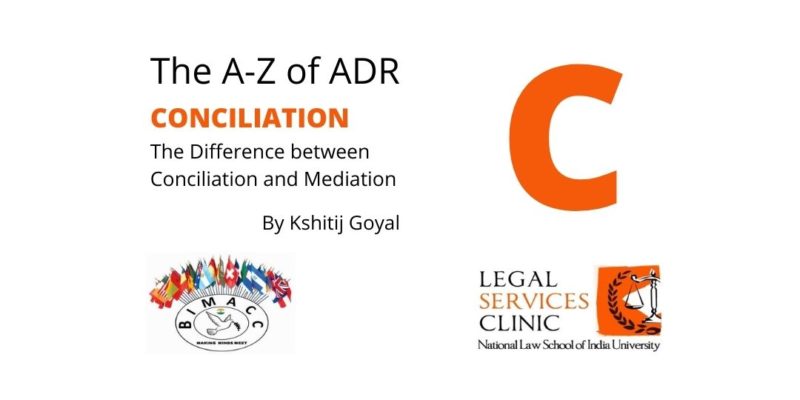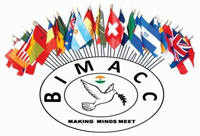
A-Z of ADR: Conciliation- The Difference between Conciliation and Mediation
– Kshitij Goyal (II Year, NLSIU Bangalore)
Conciliation
Meaning:
Conciliation refers to the process of dispute resolution in which two or more parties try to reach an amicable settlement with the help of the third party. In this process, the conciliator, the third party has an active role to find the solution as he can propose a solution to end the conflict, but it must be kept in mind that conciliation is inherently a non-binding procedure. In contrast, judges and arbitrators decide cases in the form of a judgement or award which is binding on the parties. In India, Conciliation is governed by the Arbitration and Conciliation Act 1996. In Haresh Dayaram Thakur v. State of Maharashtra and Ors[1], the court while dealing with the Sections 73 and 74 of the Arbitration and Conciliation Act of 1996, held that successful conciliation proceedings come to an end only when the settlement agreement signed and affixed by the parties comes into existence and such an agreement has the effect and status of an arbitral award under Section 74.
Procedure[2]:
1.Commencement of the proceedings in Conciliation [Section 62]:
The proceedings in the conciliation are initiated by the written invitation sent by one party to the other. The subject of the dispute should be clearly identified in the invitation. If the party initiating conciliation doesn’t receive a reply within thirty days from the date of sending of invitation, it may be termed as the rejection of the invitation to conciliate.
2. Submission of Statement of Conciliator [Section 65]:
A brief written statement may be requested by the conciliator from each party. The statement should contain the information including the points at issue and the general nature of the dispute. Each party must send the copy of the statement to the other party. The conciliator may then request each party afterwards to submit the written statement of the facts and the grounds in its support.
3.Conduct of the proceedings in Conciliation [Section 69(1), 67(3)]:
The parties may be invited by the conciliator to meet him. He may communicate with the parties in writing or orally. He may communicate with the parties separately or together. He may conduct the parties in a manner as he may consider appropriate, but he should take the decision considering the circumstances.
4. Administrative assistance [Section 68]:
The parties and conciliator may seek administrative assistance by the suitable institution or the persons with the consent of the parties.
Kinds of Conciliation:
- Voluntary Conciliation– Parties can participate voluntarily in this process of conciliation for resolving their disputes
- Compulsory Conciliation– In this process, parties are mandated, either by legislations or prior agreements, to attempt to settle their disputes through conciliation. For instance, attempts to arrive at a solution through conciliation is mandatory for labour disputes.
Advantages of Conciliation:
- It offers a more flexible alternative for a variety of disputes, both small and large.
- It obviates the parties from seeking the remedy in the court.
- It maintains the freedom of the parties to withdraw from the process at any stage of the proceedings without any prejudice to their legal position.
- It maintains confidentiality throughout the proceedings.
- It is cost-effective and produces a quicker resolution of the dispute.
- It facilitates the maintenance of the continued relationship between the parties even after the settlement is arrived at and at least during the process of settlement. This feature is important to the parties who want to maintain the relationship despite the dispute, particularly in family relationships, etc.
Disadvantages of conciliation:
- India lacks an obligatory mechanism, which is useful especially when imposed shortly after the litigation is filed.
- The subject matter of disputes is generally quite limited in India.
- Conciliation processes often involve lawyers and not the disputing parties themselves.
- Finally, there is no set time provided in the statute within which the decision must be made.
- The conciliator may not be a legally qualified person to resolve the disputes and his order is not binding on the parties.
Difference between Conciliation and Mediation
Conciliation tries to individualize the optimal solution and direct parties towards a satisfactory common agreement. Although this sounds strikingly similar to mediation, there are important differences between the two methods of dispute resolution. In conciliation, the conciliator plays a relatively direct role in the actual resolution of a dispute and even advises the parties on certain solutions by making proposals for settlement. The conciliator, not the parties, often develop and propose the terms of settlement. The parties come to the conciliator seeking guidance and the parties make decisions about proposals made by conciliators. They are usually seen as an authority figure who is responsible for facilitating the best solution for the parties. In this regard, the role of a conciliator is distinct from the role of a mediator.
The mediator, at all times, maintains his or her neutrality and impartiality. A mediator does not focus only on traditional notions of fault and a mediator does not assume sole responsibility for generating solutions. Instead, a mediator works together with the parties as a partner to assist them in finding the best solution to further their interests. A mediator’s priority is to facilitate the parties’ own discussion and representation of their own interests, and guide them to their own suitable solution- a good common solution that is fair, durable, and workable. The parties play an active role in mediation, identifying interests, suggesting possible solutions, and making decisions concerning proposals made by other parties. The parties come to the mediator seeking help in finding their own best solution.[3]
Conclusion
The mental attitude of the parties, the proper working environment backed by the infrastructural facilities for servicing the conciliation procedure, and the skills of the conciliator determine the success of conciliation. The mental attitude ranges from the inclination of the parties to a common settlement to the absence of any objection to such settlement.
To briefly summarize, a conciliator may give expert advice and use intervention techniques to influence the likely terms of the agreement and also encourage the parties to settle the dispute amicably. The mediator on the other hand assists the parties to communicate with each other so they can explore, identify the issues before even considering the option to reach a mutually accepted agreement.
[1] AIR 2000 SC 2281.
[2] Sujay Dixit, ‘Principles and Procedure of Conciliation under Arbitration and Conciliation Act 1996’, Legal Services India, < http://www.legalservicesindia.com/article/725/Principles-&-Procedure-of-conciliation-under-Arbitration-&-Conciliation-Act-1996.html> accessed 29 July 2020.
[3] Alessandra Sgubini, ‘Arbitration, Mediation and Conciliation’, MEDIATE, < https://www.mediate.com/articles/sgubiniA2.cfm> accessed 27 July 2020.
– Kshitij Goyal (II Year, NLSIU Bangalore)
Kshitij Goyal is a second-year student from the National Law School of India University (NLSIU), Bangalore.
BIMACC expresses its gratitude towards the author and to the members of the Legal Services Clinic, National Law School of India University (NLSIU) for their support in our collaborative efforts to promote ADR with this series titled “A-Z of ADR”. The purpose of this series is to increase the understanding of certain fundamental concepts of Alternative Dispute Resolution.
The Legal Services Clinic is a student-run committee that provides free legal services to the socially and the economically backward sections of the society who have difficulty accessing the judicial system. It also has a mandate of spreading legal awareness and providing free legal assistance to those who cannot afford it.
Website: www.legalservicesclinic.org/
Facebook: @legalservicesclinic
Email: lsc.nlsiu@gmail.com
Phone Number: 073586 73214
Disclaimer: The views and opinions expressed in this blog are those of the author and do not necessarily reflect the official policy or position of BIMACC, any of the members of the Board, or the empanelled neutrals. This blog is for informative purpose only and does not constitute legal advice in any manner whatsoever.
